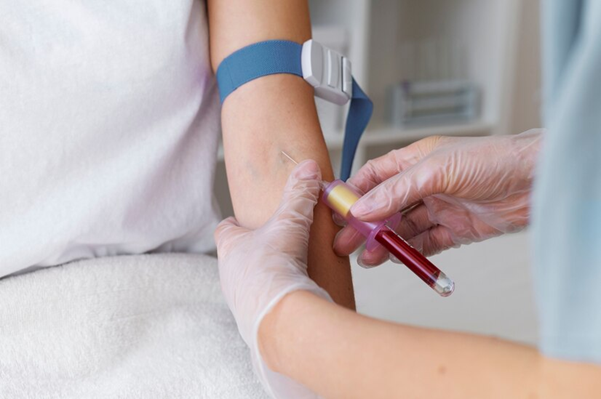Thyroid Panel Test: A Comprehensive Guide to Monitoring Your Health
- Home

The thyroid panel test is a crucial step in keeping tabs on your health. The thyroid gland plays a significant role in our bodies. It helps regulate metabolism, energy, and even mood. Understanding how the thyroid panel test fits into health management is key. This test checks for thyroid problems by measuring hormone levels. These hormones are essential for many bodily functions. Regular testing can help catch issues early, making treatment easier and more effective. Overall, getting a thyroid panel test is an important part of maintaining wellness and catching potential health issues early. It gives insight into your thyroid function, revealing potential imbalances.
By monitoring your thyroid health, you can better manage your overall well-being. Learning more about these tests can help you understand their importance and take control of your health.
Understanding the Thyroid Gland and Its Role
The thyroid gland is located in your neck, right below the Adam’s apple. This small, butterfly-shaped gland has a significant job. It produces hormones that control metabolism, energy levels, and heart health. When these hormones are off-balance, they can affect your body in numerous ways.
Thyroid hormones influence many body functions, including: – Metabolism rate – Energy usage – Heartbeat regulation
Common thyroid disorders include hypothyroidism and hyperthyroidism. Hypothyroidism occurs when the gland doesn’t produce enough hormones, leading to tiredness and weight gain. Hyperthyroidism, on the other hand, is when the gland produces too much hormone, causing weight loss and anxiety. Both conditions highlight how important a healthy thyroid is to overall well-being. Thus, understanding the thyroid and its functions is essential for grasping how it impacts your health.
Insights into the Thyroid Panel Test
The thyroid panel test is a combination of blood tests. It primarily checks how well your thyroid gland is functioning. A full thyroid panel blood test includes several components:
- TSH (Thyrotropin Blood Test): Evaluates how well the thyroid is working.
- T4 (Thyroxine Blood Test): Measures the amount of thyroxine hormone.
- T3: Checks the triiodothyronine hormone level.
- Thyroid antibodies: Identify possible autoimmune thyroid issues.
Each part of the test provides insight into specific areas of thyroid function. Altogether, they help doctors understand your thyroid health more clearly.
Recognizing Symptoms Indicating a Thyroid Panel Test
Certain symptoms might suggest you need a thyroid panel test. These symptoms include:
- Constant fatigue
- Significant weight gain or loss
- Depression or anxiety
- Difficulty concentrating
Risk factors for thyroid issues include a family history of thyroid problems or autoimmune diseases. It may be wise to check your thyroid if you fit these criteria. Certain life stages or situations also prompt regular checks. For example, during pregnancy, thyroid health is crucial. Hormonal changes can impact both the mother and baby, making monitoring necessary.
The TSH panel can reveal why you feel unwell and help guide treatment. Early detection through a blood test TSH can lead to timely treatment options, improving your quality of life.
Preparing for Your Thyroid Panel Test
Preparation for a thyroid panel test is straightforward. Some steps to follow include:
- Fasting Requirement: Generally, fasting isn’t required, but follow your doctor’s instructions.
- Medication: You might need to pause certain medications. Consult your healthcare provider for advice.
- Best Time for the Test: Morning is often ideal for accurate hormone levels.
With these steps, you can ensure your test results are as accurate as possible.
Deciphering Your Thyroid Test Results
Understanding the thyroid panel test results can be enlightening. Normal TSH ranges are typically 0.4 to 4.0 mU/L. Blood test TSH meaning varies based on these levels. Higher than normal TSH levels might indicate hypothyroidism. Lower levels might suggest hyperthyroidism.
If results are abnormal, it could mean your thyroid isn’t functioning correctly. Further tests might be needed to pinpoint the issue. Abnormal levels in the thyroxine blood test could suggest possible thyroid gland issues or medication adjustments. Decoding these results helps shape the next steps in your health journey.
Proactive Steps After Receiving Test Results
After receiving thyroid panel test results, you should:
- Discuss the results with your healthcare provider.
- Consider further testing if necessary.
- Explore treatments or medication options.
Early diagnosis and treatment can prevent complications. Being proactive can protect your health and ensure any thyroid issues are managed appropriately.
Lifestyle Adjustments for Optimal Thyroid Health
To maintain thyroid health, consider these steps:
- Dietary Changes: Incorporate foods rich in iodine and selenium.
- Stress Management: Practice relaxation techniques and regular breaks.
- Exercise: Engage in moderate, regular physical activities to boost energy levels.
These lifestyle adjustments can enhance thyroid function and contribute to overall wellness. By maintaining a balanced diet, managing stress, and staying active, you support your thyroid health directly.
Commitment to Regular Thyroid Monitoring
Regular thyroid panel tests are crucial for ongoing health. Testing frequency may vary, discuss it with your doctor. Monitoring ensures any changes in thyroid function are detected early. With careful attention, you can maintain better health and stay informed about your thyroid status.
Ensure Your Thyroid Health with Askam Healthcare and Scientific
A thyroid panel test is essential for detecting thyroid imbalances and ensuring overall well-being. Our expert team provides accurate testing and personalized care to help you manage your thyroid health effectively.
Schedule your thyroid panel test today at Askam Healthcare and Scientific for better health!
